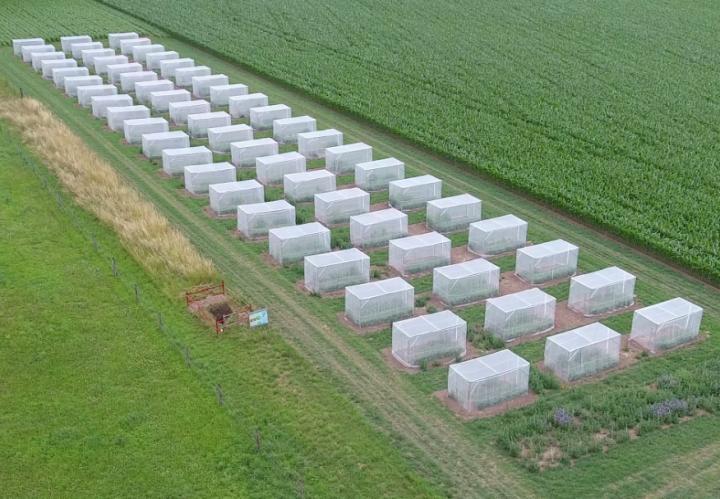Research team led by the University of Göttingen emphasizes the benefits of diversifying flower resources

Credit: F Klaus/University of Göttingen
A higher diversity of flowering plants increases the breeding success of wild bees and may help compensate for the negative effects of insecticides. This is what researchers from the Universities of Göttingen and Hohenheim, as well as the Julius Kühn Institute, have found in a large-scale experimental study. The results have been published in the scientific journal Ecology Letters.
In their experiment, the researchers investigated how successfully the wild bee Osmia bicornis (red mason bee) reproduced. Red mason bees are important for both ecological and economic reasons. The wild bees were experimentally kept in more than 50 large enclosure cages with flower mixtures of varying wild plant diversity and insecticide-treated oilseed rape. Subsequently, the reproductive success of the wild bees, as measured by the number of their brood cells and emerged offspring, was investigated over several months.
The research team found that the number of cells that the wild bees created for their offspring where species-rich flowering mixtures were available was twice that of wild bees where only oilseed rape was available. The reproductive success of the wild bees, which have to supply their offspring with pollen and nectar, increased both in cages with a large diversity of flowering plants and where there were particularly important plant species. In contrast, if oilseed rape treated with clothianidin (from the neonicotinoid class of insecticides), was available to the bees, this had a negative effect on their reproductive success. However, this negative effect of the insecticide only occurred in cages with oilseed rape monocultures, which suggests that such effects can be mitigated by alternative food resources from species-rich flowering mixtures.
The study shows that both the diversity of flowering plants and exposure to insecticides significantly influence the reproductive success of wild bees, and shows that a high diversity of flowering plants could compensate for the negative effects of insecticides. “One possible explanation is that bee larvae benefit from additional nutrients, and are exposed to fewer insecticides, when the pollen of other plant species besides oilseed rape is available to them,” explains Felix Klaus, first author of the study and PhD student in the Agroecology Group at Göttingen University. “Our results emphasise the important role of species-rich resources of flowers for wild bees,” adds Professor Ingo Grass, head of the Department of Ecology of Tropical Agricultural Systems at the University of Hohenheim. “If sufficiently diverse flowers are available in the agricultural landscape, this could counteract the negative effects of monocultures and insecticides,” says Professor Teja Tscharntke, Head of the Agroecology Group at Göttingen University.
###
Original publication: Felix Klaus et al. (2021): Floral resource diversification promotes solitary bee reproduction and may offset insecticide effects – evidence from a semi-field experiment. Ecology Letters. DOI: 10.1111/ele.13683 or here to see the paper: https:/
Contact:
Felix Klaus
University of Göttingen
Faculty of Agricultural Sciences
Department of Crop Sciences – Agroecology Group
Grisebachstraße 6, 37077 Göttingen
Tel: +49 (0)551 3922359
Email: [email protected]
https:/
Professor Teja Tscharntke
University of Göttingen
Faculty of Agricultural Sciences
Department of Crop Sciences – Agroecology Group
Tel: +49 (0)551 399209
Email: [email protected]
Professor Ingo Grass
University of Hohenheim
Department of Ecology of Tropical Agricultural Systems
Institute of Agricultural Sciences in the Tropics
Garbenstraße 13, 70599 Stuttgart
Tel: +49 (0) 711 459-22385,
Email: [email protected]
https:/
Media Contact
Melissa Sollich
[email protected]
Original Source
https:/
Related Journal Article
http://dx.




